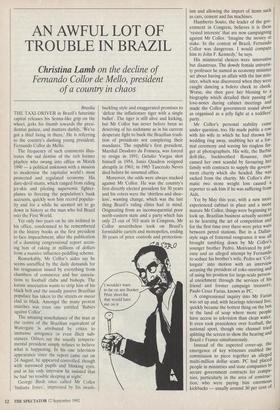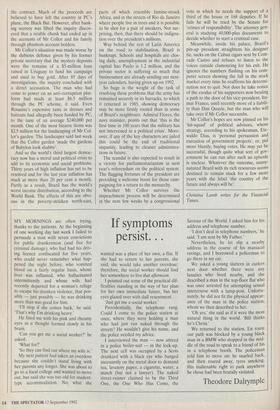AN AWFUL LOT OF TROUBLE IN BRAZIL
Christina Lamb on the decline of
Fernando Collor de Mello, president
of a count'', in chaos Brasilia THE TAXI-DRIVER in Brazil's futuristic capital releases his Senna-like grip on the wheel, jerks his thumb towards the presi- dential palace, and mutters darkly, `We've got a thief living in there.' He is referring to the country's dashing young president, Fernando Collor de Mello.
The frequency of such comments illus- trates the sad demise of the rich former playboy who swung into office in March 1990 — a political unknown with a mission to modernise the capitalist world's most protected and regulated economy. His dare-devil stunts, which ranged from riding jet-skis and piloting supersonic fighter- planes to freezing the population's bank accounts, quickly won him record popular- ity and for a while he seemed set to go down in history as the man who led Brazil into the First World.
Yet only two years on he sits isolated in his office, condemned to be remembered in the history books as the first president to face impeachment, after the publication of a damning congressional report accus- ing him of raking in millions of dollars from a massive influence-peddling scheme.
Remarkably, Mr Collor's aides say he
seems unruffled by the daily demands for his resignation issued by everything from chambers of commerce and bar associa- tions to football clubs and bishops. The karate association wants to strip him of his black belt and the usually passive Brazilian populace has taken to the streets en masse clad in black. Amongst the many protest marches was even one entitled 'Babies against Collor'.
The amazing nonchalance of the man at the centre of the Brazilian equivalent of Watergate is attributed by critics to immense arrogance or even illicit sub- stances. Others say the usually tempera- mental president simply refuses to believe what is happening. In his one television appearance since the report came out on 24 August, he appeared controlled, though with narrowed pupils and blinking eyes, and in his only interview he insisted that he had 'no trouble sleeping at night'.
George Bush once called Mr Collor 'Indiana Jones', impressed by his swash- buckling style and exaggerated promises to 'defeat the inflationary tiger with a single bullet'. The tiger is still alive and kicking, but Mr Collor has never before been so deserving of his nickname as in his current desperate fight to buck the Brazilian tradi- tion of presidents not completing their mandates. The republic's first president, Marshal Deodoro da Fonseca, was forced to resign in 1891; Getulio Vargas shot himself in 1954, Janio Quadros resigned abruptly in 1961; in 1985 Tancredo Neves died before he assumed office.
Moreover, the odds were always stacked against Mr Collor. He was the country's first directly elected president for 30 years and his voters were the 'shirtless and shoe- less', wanting change, which was the last thing Brazil's ruling elites had in mind. Originating from an inconsequential poor north-eastern state and a party which has only 23 out of 503 seats in Congress, Mr Collor nevertheless took on Brazil's formidable cartels and monopolies, ending 30 years of price controls and protection- ism and allowing the import of items such as cars, cement and fax machines.
Humberto Souto, the leader of the gov- ernment in Congress, believes it is these 'vested interests' that are now campaigning against Mr Collor. 'Imagine the money at stake. In the context of Brazil, Fernando Collor was dangerous. I would compare him to John F. Kennedy,' he says.
His ministerial choices were innovative but disastrous. The dowdy female universi- ty professor he named as economy minister set about having an affair with the law min- ister, which was discovered when they were caught dancing a bolero cheek to cheek. Worse, she then gave her blessing to a biography which detailed their passing of love-notes during cabinet meetings and made the Collor government sound about as organised as a jelly fight at a toddlers' party.
Mr Collor's personal stability came under question, too. He made public a row with his wife in which he had thrown his wedding ring away, snubbing her at a for- mal ceremony and waving his ringless fin- ger at photographers. His wife, the Barbie doll-like, bucktoothed Rosanne, then caused her own scandal by favouring her family with contracts to supply the govern- ment charity which she headed. She was sacked from the charity. Mr Collor's dra- matic two stone weight loss caused a reporter to ask him if he was suffering from Aids.
Yet by May this year, with a new more experienced cabinet in place and a more mature Mr Collor, things were beginning to look up. Brazilian business actually seemed to be learning the art of competition and for the first time ever there were price wars between petrol stations. But in a Dallas
style saga of fraternal vengeance it was all brought tumbling down by Mr Collor'S younger brother Pedro. Motivated by jeal- ousy and an alleged attempt by Fernando to seduce his brother's wife, Pedro set 'Collorgate' into motion with an interview accusing the president of coke-snorting and of using his position for large-scale person- al enrichment through the services of his friend and former campaign treasurer, Paulo Cesar Farias, known as PC.
A congressional inquiry into Mr Farias was set up and, with hearings televised live, quickly became the hottest thing on the box in the land of soap where more people have access to television than clean water. It even took precedence over football, the national sport, though one channel tried splitting the screen to show the hearing and Brazil v France simultaneously.
Instead of the expected cover-up, the emergence of key witnesses enabled the commission to piece together an alleged multi-million dollar scam. PC had placed people in ministries and state companies to secure government contracts for compa- nies, particularly in the area of construc- tion, who were paying him enormous kickbacks — usually around 30 per cent of
the contract. Much of the proceeds are believed to have left the country in PC's plane, the Black Bat. However, after bank- ing secrecy was lifted the inquiry discov- ered that a sizable chunk had ended up in the accounts of Mr Collor and his family through phantom account holders.
Mr Collor's situation was made worse by the dubious defence given by his former private secretary that the mystery deposits were the remains of a $5-million loan raised in Uruguay to fund his campaign and used to buy gold. After 85 days of investigations, the inquiry concluded with a direct accusation. The man who had come to power on an anti-corruption plat- form had made at least $6.5 million through the PC scheme, it said. Even Rosanne's expensive taste in dresses and haircuts had allegedly been funded by PC, to the tune of an average $240,000 per month. One of the most bizarre items was $2.5 million for the landscaping of Mr Col- lor's garden. The landscaper said last week that the Collor garden 'made the gardens of Babylon look shabby'.
And so the world's third largest democ- racy now has a moral and political crisis to add to its economic and social problems. Thirty years of high inflation has yet to be resolved and for the last year inflation has stuck at more than 20 per cent a month. Partly as a result, Brazil has the world's worst income distribution, according to the World Bank. The effects of this are obvi- ous in the poverty-stricken north-east, parts of which resemble famine-struck Africa, and in the streets of Rio de Janeiro where people live in trees and it is possible to be shot for a pair of sneakers. Not sur- prising, then, that there should be indigna- tion over the president's millions.
Way behind the rest of Latin America on the road to stabilisation, Brazil is bankrupt. Schools and hospitals are clos- ing daily, unemployment in the industrial capital Sao Paulo is 1.2 million, and the private sector is suffering so much that businessmen are already sending out next- year calendars, having given up on 1992.
So huge is the weight of the task of resolving these problems that the army has remained securely in its barracks, to which it returned in 1985, showing democracy may be more firmly rooted than in some of Brazil's neighbours. Admiral Flores, the navy minister, points out that `this is the first time in 100 years that the military has not intervened in a political crisis'. More- over, if any of the key characters are jailed this could be the end of traditional impunity, leading to cleaner administra- tions in future.
The scandal is also expected to result in a victory for parliamentarianism in next year's referendum on the political system. The flagging fortunes of the president are providing a welcome boost for those cam- paigning for a return to the monarchy.
Whether Mr Collor survives the impeachment process will be determined in the next few weeks by a congressional vote in which he needs the support of a third of the house or 168 deputies. If he fails he will be tried by the Senate for 'crimes of responsibility'. The attorney gen- eral is studying 40,000-plus documents to decide whether to start a criminal case.
Meanwhile, inside his palace, Brazil's pin-up president straightens his designer tie, sucks on the Cuban cigars sent by Com- rade Castro and refuses to listen to the voices outside clamouring for his exit. He ignores the numbers flashing on his com- puter screen showing the fall in the stock market every time he reaffirms his determi- nation not to quit. Nor does he take notice of the exodus of his supporters now beating a path to the door of his vice-president, Ita- mar Franco, until recently more of a liabili- ty than Dan Quayle, but the man who will take over if Mr Collor succumbs.
Mr Collor's hopes are now pinned on his 'hit-squad' of political advisors, whose strategy, according to his spokesman, Ete- waldo Dias, is `personal persuasion and execution of government projects', or, put more bluntly, buying votes. He may yet be successful, though quite what sort of gov- ernment he can run after such an episode is unclear. Whatever the outcome, sunny- natured Brazil with its rich resources seems destined to remain stuck for a few more years with the label `the country of the future and always will be'.
Christina Lamb writes for the Financial Times.



































































 Previous page
Previous page